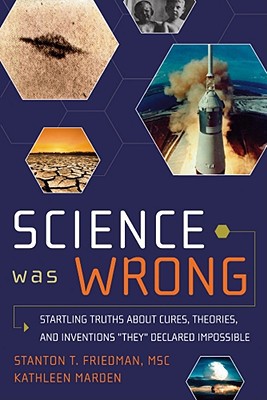

 |

|

The average rating for Science Was Wrong: Startling Truths About Cures, Theories, and Inventions They Declared Impo... based on 2 reviews is 4 stars.
Review # 1 was written on 2013-10-21 00:00:00 Liudmila Muysina De Quiros Liudmila Muysina De QuirosThe title of this book is a paradox. The fact that there have been many instances in which science was wrong in the past is not a reason to lack confidence in the enormous importance and value of science. What individual, group or discipline is not sometimes, and even oftentimes wrong? The reason that this book is worthwhile reading is that science and the mentality of some who revere science is such that there is something embarrassing or blameworthy about making mistakes. This sounds quite trite, I am sure, but the book's listing of many cases in which the conventional wisdom of science has been wrong, and that then subsequently gives way to new forms of conventional wisdom is a valuable lesson that concerns humanity's relationship with the conventional wisdom. Beginning with the "impossibility" of air flight, Stanton Friedman and his co-author, Kathleen Marden discuss a long list of advancements that were "impossible." The scientists who are discussed range from the now renowned Robert H. Goddard, to Immanuel Velikovsky who was a scientist who is still a popular target of skeptics, debunkers and other priests of the current scientific paradigms. That science has been wrong on many occasions is not a rebuke to science, and the authors do not intend for it to be so. But Friedman and Marden's book is a powerful rebuke against the elevation of ego over truth or, more accurately, the pursuit of the truth. After all, when science is wrong, it is ultimately proved wrong by science! |
Review # 2 was written on 2019-11-20 00:00:00 Darren Pyles Darren PylesI am a fan of Friedman's but this book missed the mark. It got off to a very strong start in discussions of aviation and space and how the "impossibilitists" got it all wrong. Friedman effectively drove home the point that technologies that seemed like unachievable fantasies could quickly become even stronger and more commonplace than people would generally predict. These examples greatly reinforced the author's point about resistance to new and strange-sounding ideas. However, I believe the author got sidetracked and began taking on topics that did not fit in with his overall theme. For instance, I think it was an error for the author to tackle cold fusion. To date people are still debating the Fleischmann–Pons claims of cold fusion. I just read a book by Berkeley physics professor Richard Muller, who strongly refutes the cold fusion claims. Even though I value Friedman's analysis as a trained nuclear physicist from a prestigious university, I can't accept the reality of cold fusion simply on his word when other people with similar credentials refute the same. His argument would have been made stronger had he performed his own experiments on the subject, but there is no indication that this is the case. Since this still is a live debate (in my view), it does not fit in well with the theme of Science Was Wrong. In this case, science is still deciding. Similarly, he should have avoided global warming. Though he makes a number of valid points, he is essentially asking the reader to take his word on the matter even though he is not a climatologist and in spite of all those who argue that global warming is both real and man made. To be clear, there is certainly nothing wrong with his having a point of view and arguing in favor of it; I am just opposed to the way he is essentially seems to be presenting his opinion as established fact. I also thought some of his topics from the medicine and politics sections missed the mark. It seems like the theme for these topics was closer to how politics and politicians can muck things up despite contrary indications from science as opposed to the actual science being wrong. This is in sharp contrast to the earlier on-point subjects where highly educated experts were declaring a technology impossible from an intellectual point of view, not a politically driven one. I'm not saying his conclusions are wrong, just that they seemed to me to be an ill fit. But on the positive side, we can see Friedman make the argument that politics/government has the same effect on the subjects of his final section, which focuses on UFOs and psi phenomena. I just feel the message gets a little confused along the way. As I have just alluded, Friedman finishes up his book with a section called Frontiers of Science. Here he argues in favor of the reality of UFOs and psi phenomena. For those who are already familiar with Friedman, this will come as no surprise. In general his argument is, look at all the mainstream scientists who have been dead wrong on subjects that we take for granted today - they're wrong about UFOs and psi as well. Of course he (with contributions from Marden) presents his evidence and arguments for why he believes these subjects are genuine, which is a difficult task considering the volumes of evidence out there. All in all it was a decent book and I learned a lot of new things, even from the chapters that I felt were too far afield. And as always, his work is meticulously researched with a robust notes and bibliography included. |
CAN'T FIND WHAT YOU'RE LOOKING FOR? CLICK HERE!!!